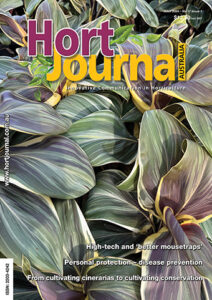
Intergenerational learning combines skills in horticulture
There is often a lot of talk about the ageing workforce in horticulture, so it was heartwarming to see many young people in attendance at a conference I attended recently for the International Plant Propagators Society (IPPS). They were a breath of fresh air and contributed enormously to the event. I could see from all involved, a mutual respect and love of horticulture.
So why is it so important to have a diverse age group of people working together? Intergenerational learning is beneficial on many levels. Experienced horticulturists bring decades of knowledge and experience to the industry, and have a deep understanding of propagation techniques, managing pests and diseases, growing media requirements and adapting cultivation practices to different climates. This is always obvious at these events as many of the speakers share their knowledge. Collectively, there are hundreds of years of knowledge that is lost if not shared.
New and younger people coming into the industry bring different skills, in particular they have a good understanding of sustainability and are often very familiar with technology and the digital world.
The transfer of knowledge between generations can only be beneficial to any business and its operations. Older and experienced horticulturists or business owners have the opportunity to build relationships via mentorship and in return be open to learning skills from younger generations. Intergenerational sharing of knowledge and skills cultivates innovative ideas, enhances communication within the business, and ensures skills are passed down and new skills are learnt. I also believe it is our responsibility to mentor new people to our industry and by doing that we continue to learn ourselves. You may have noticed, if you use social media, what a great job Zoe Williams, propagator at Glasshouse Tubestock in Queensland, is communicating news from IPPS social pages. Zoe is an exceptional young woman and was also a winner of the Global Footprints Scholarship in 2022, where she travelled overseas and worked in some of the worlds best production nurseries and gardens. Zoe is a great example of intergenerational learning and has already started giving back to an industry she feels passionate about.
I have also been asked to be part of the assessment pool for the 2024 Global Footprints Scholarship in horticulture. I am a huge fan of this program and am looking forward to seeing the applications. I have met a few of the previous scholars and have been impressed by their commitment and passion, and what they have already bought to our industry. This scholarship changes lives through the opportunity of learning new skills overseas that they can bring back and share with their colleagues.
On another topic, Sustainable Gardening Australia, a not-for-profit registered charity, is hosting a forum in mid-August titled ‘Climate Resilient Gardening’. This event is an opportunity to consider the effects climate change will have on our gardens and gardening practices. The host will be Dr Greg Moore OAM, and the speakers include landscape designer Emmaline Bowman, Director of STEM Landscape Architecture & Design, University of Melbourne plant scientist Assoc. Professor Claire Farrell, and urban soil expert Declan McDonald. Declan wrote for Hort Journal about soils for many years. For more information about the event, its speakers and ticket purchases, visit: https://www.sgaonline.org.au/training/forums/
Enjoy the read
Karen Smith and your Hort Journal Team
